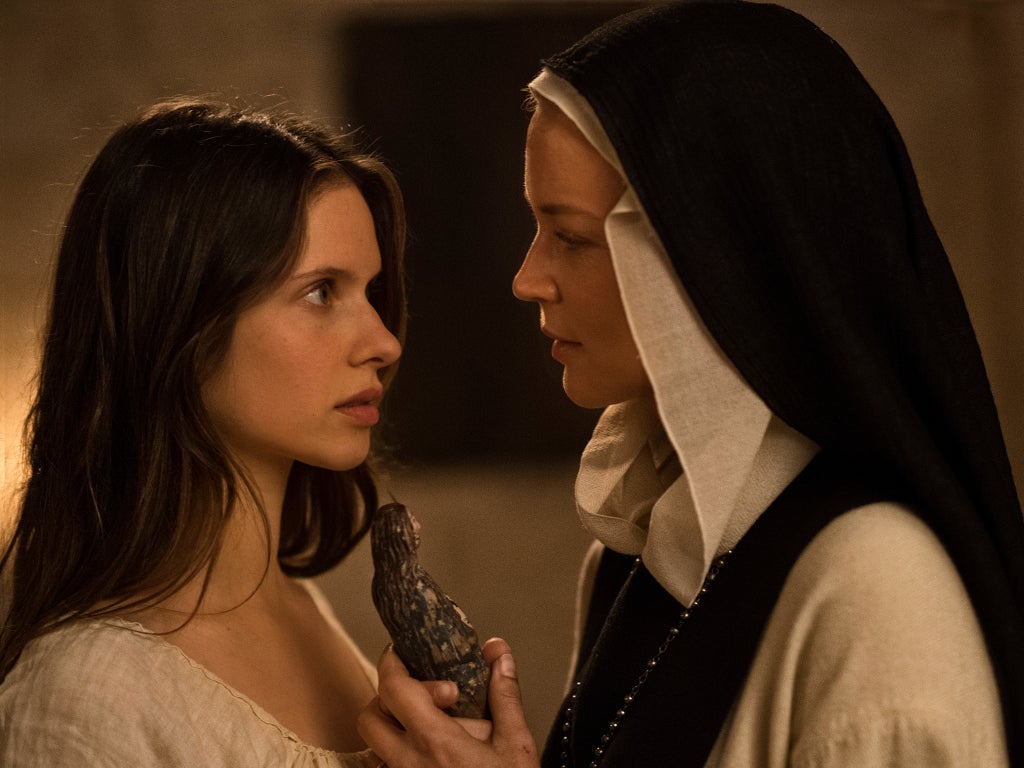
Dir: Paul Verhoeven. Starring: Virginie Efira, Lambert Wilson, Daphne Patakia, Olivier Rabourdin, Clotilde Courau, Charlotte Rampling, Hervé Pierre. 18, 132 minutes.
In Benedetta, master provocateur Paul Verhoeven demolishes the line between the sacred and the profane. The breast becomes holy, a source of nourishment from which religious fervour can stem. The Virgin Mary, in turn, inspires not only boundless grace but sexual desire. One of the first moments of clarity experienced by the young Benedetta – newly enrolled by her father into a Tuscan convent – sees a statue of Mary collapse on top of her as she prays for guidance. Its exposed left breast lands neatly about her mouth. She kisses it with deferential affection.
Devotion comes in many forms, though the Catholic Church would like us to believe that any expression not tied to pain or suffering is blasphemous in nature. Verhoeven, and Benedetta herself, would heartily disagree. The film’s standout scene – or at least, the one people have been incessantly tweeting about since its premiere at last year’s Cannes Film Festival – sees another, smaller, statue of Mary whittled down into a wooden dildo and deployed with rapture. No wonder the American Society for the Defense of Tradition, Family and Property condemned the film as “pornographc filth” and protested its early screenings.
The film is, in fact, based on the real-life Benedetta Carlini, a 17th-century nun thrown into prison for her sexual relationship with another sister. We know a surprising amount of detail about the case due to the keen interest of a parish scrivener, who feverishly documented it in his diary. Verhoeven has copied over many of the story’s central events: Benedetta (Virginie Efira) is not only caught in flagrante delicto with Sister Bartolomea (Daphné Patakia), but in a series of vicious power struggles – first with the Abbess (Charlotte Rampling), then with the nuncio (Lambert Wilson), a papal envoy. Benedetta has had visions of Christ and bears the bloody marks of the stigmata, but speaks her proclamations in words deemed too lascivious to be the word of God.
Is this a sign from above? Devilry? Or the very human acts of a woman whose ardour has twisted into ambition? Verhoeven hints towards the last of these when a piece of broken pottery tumbles out of Benedetta’s robes, moments after she collapses to the floor, blood trickling down her brow. But, crucially, he doesn’t commit to an answer, and it’d be wrong to treat his film as any kind of anti-faith screed, even if it toys its audience with all the fiendishness that you’d expect from the director of Showgirls.
Verhoeven, though an atheist, is a bit of a Christ obsessive – he co-authored a book about his life and was a member of a scholarly group called the Jesus Seminar. Perhaps that’s why Benedetta doesn’t fit as neatly into the nunsploitation genre as you might expect, despite its superficial similarities with films like Ken Russell’s The Devils. Sexual liberation isn’t sought through blasphemy, but by challenging what the very nature of worship looks like. Can you show your love to God by showing love between a woman’s legs?
The most interesting point of contention in the entire film isn’t necessarily what lies between Benedetta and the church, but between Benedetta and Bartolomea. The latter first appears as the ingénue who’s not so innocent – the one driven by earthly desires, who farts like a thunderclap in front of her fellow sister and then immediately tries to jump into bed with her. It’s she who awakens the older and wiser Benedetta to a world of euphoric pleasures, though it’s Benedetta who then seems to, arguably, take things a little too far. First by attempting to create a direct bridge between her orgasms and the heavens themselves. It’s a subtle power shift between the two characters that’s beautifully managed in Efira and Patakia’s performances, not only in the way these two nuns talk, but in how they have sex. Benedetta struts around in the cloth of something far trashier than it really is – the sex scenes feel more like giddy exploration than something truly lurid, and Jeanne Lapoirie’s cinematography remains tastefully muted in its tones. That’s despite the film featuring a cutaway of a performing fool being chased around by skeletons while lighting his own farts. As Benedetta says: “Shame does not exist under God’s love.”
‘Benedetta’ is in cinemas now, and can be streamed via Mubi from 1 July







